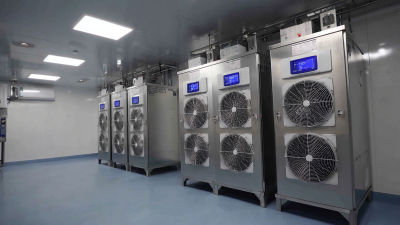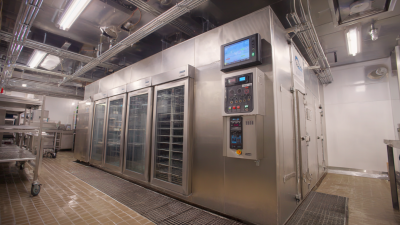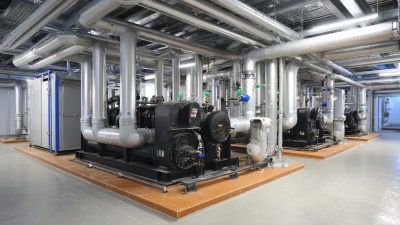The Science Behind Effective Refrigeration Panels for Optimal Cooling Performance
Table of Contents
- Understanding Refrigeration Panels: Key Components for Efficiency
- The Role of Insulation in Maximizing Cooling Performance
- Comparative Analysis: Traditional vs. Advanced Refrigeration Technologies
- Material Selection: How It Impacts Thermal Conductivity and Performance
- The Science of Temperature Regulation: Mechanisms Behind Effective Cooling
- Innovations in Refrigeration Panel Design for Enhanced Sustainability
- Essential Guide to Selecting the Right Refrigeration Unit Compressor for Your Cold Room Needs
- FAQS
- Conclusion
- Related Posts
Refrigeration panels pretty much are the backbone of any good cold storage system—they really impact how well everything cools down. Did you know that, according to the International Institute of Refrigeration, using the right insulation and design can actually save up to 30% of energy? That's huge for industries that depend on keeping things cold. Over here at Guangxi Cooler Refrigeration Equipment Co., Ltd., we’re all about offering a complete package—everything from planning and designing to supplying the equipment. Our team’s got the know-how to make sure each client gets tailored solutions that work perfectly for their needs. As we dig into what makes a refrigeration panel work effectively, we just want to point out how important it is to pick the right materials and tech—because it really makes a difference in how efficiently everything runs. Plus, we hope to make the whole process stress-free for our customers, so they can just focus on their business without worries.

Understanding Refrigeration Panels: Key Components for Efficiency
Refrigeration panels are really key when it comes to getting the best cooling results, whether you're dealing with store refrigeration or big-time industrial cold storage. Just recently, a report from the International Institute of Refrigeration pointed out that well-designed insulation panels can actually boost energy efficiency by up to 40%. Crazy, right? The main reason is that these panels help cut down on heat exchange, which means your refrigeration units don't have to work as hard—so you save energy. Of course, how good these panels are depends a lot on what they're made of, how thick they are, and the tech used in making them.
Some of the top materials for insulation include high-density polyurethane foam and polyisocyanurate — both of which are fantastic at keeping things cold. Based on a study published in the Journal of Thermal Science, panels that are about 4 inches thick can have R-values over 25, meaning they really cut down on energy loss. Oh, and don't forget about sealing! Making sure these panels are airtight is super important because leaks can bump up cooling costs by about 20%. When manufacturers understand these basics, they can create more efficient refrigeration solutions that not only meet industry standards but also save a lot of cash in the long run.
The Science Behind Effective Refrigeration Panels
This chart illustrates the thermal conductivity, insulation thickness, and energy efficiency ratings of different refrigeration panel types, showcasing how these factors contribute to optimal cooling performance.
The Role of Insulation in Maximizing Cooling Performance
Insulation is pretty much the key to getting the most out of refrigeration panels when it comes to cooling performance. Good insulation helps cut down on thermal bridging, which means less heat sneaking in or escaping from the unit. Honestly, a report from the American Society of Heating, Refrigerating and Air-Conditioning Engineers (ASHRAE) even says that using proper insulation can boost energy efficiency by up to 30% in refrigeration systems. So, by choosing materials like polyurethane foam or expanded polystyrene—things that don’t transfer heat easily—those panels can keep things cool inside without wasting too much energy.
When you're picking out insulation for those panels, keep an eye on the R-value—it’s basically a measure of how well it resists heat flow. The higher the number, the better it insulates. Also, don’t forget to go for moisture-resistant options; nobody wants mold or decay messing up the system and dragging down efficiency over time.
If you really want to step up your game, consider some of the newer insulating techniques. For example, vacuum insulation panels—VIPs—are pretty awesome because they pack a punch in a super slim profile. A study in 'Energy and Buildings' shows that VIPs can cut energy loss by up to half compared to regular insulation. Using these kinds of innovative materials not only helps make your refrigeration more sustainable but can also keep operational costs in check in the long run.
Comparative Analysis: Traditional vs. Advanced Refrigeration Technologies
When you compare traditional cooling tech with the newer, more advanced options out there, you really see how much the cooling industry has evolved—especially for data centers. Usually, older systems rely on vapor-compression cycles. They're pretty reliable, but let’s be honest—they can gobble up a lot of energy, especially as data centers get more demanding. That’s why more folks are now turning to cutting-edge tech, like solid-state phase change materials. These materials are pretty cool because they can absorb and release heat more efficiently, which means better cooling performance overall.
Just recently, at a symposium held in Beijing, experts dove into how these advanced materials are being used across a range of temperature applications. It’s pretty exciting to see this trend catching on for data centers of all sizes—from massive setups to smaller ones. As more companies start realizing that efficient, eco-friendly cooling isn’t just a nice-to-have but a must, I believe we'll see a lot more of these innovative technologies being adopted. They promise not only better operational efficiency but also a lighter footprint on our environment.
Material Selection: How It Impacts Thermal Conductivity and Performance
Choosing the right materials is a big deal when it comes to how well refrigeration panels work — especially their thermal conductivity. Lately, there’ve been some pretty exciting advances in composite materials, particularly those that include multi-scale carbon structures. These new techs really boost thermal performance a lot. By adding thermally conductive substances at both nano- and micro-scale levels, manufacturers can fine-tune how heat moves, which means better energy efficiency for cooling systems all around.

On top of that, trying out cutting-edge manufacturing methods like Laser Powder Bed Fusion has opened up some cool possibilities, like creating complex shapes such as gyroid structures in heat exchangers. These intricate designs not only help the heat flow more smoothly but also make good use of materials like pure copper and aluminum alloys to maximize heat transfer. As we keep exploring how material properties impact thermal efficiency, the growing role of machine learning in predicting how well materials conduct heat really highlights how important smart material choices are if you want top-notch cooling performance.
The Science of Temperature Regulation: Mechanisms Behind Effective Cooling
Keeping temperature just right is pretty crucial in all sorts of applications, whether it's cooling panels in refrigeration units or high-tech clothing that helps regulate your body heat. At the core of many of these systems are phase change materials—those clever substances that can absorb or release a lot of heat as they switch between solid and liquid. They've been really grabbing attention lately in thermal energy storage because they're excellent at storing and giving off heat when needed, which boosts cooling efficiency quite a bit (did you see the latest on advancements in thermal energy storage?).
On a more personal level, understanding how our bodies manage to stay at the right temperature—what we call thermoregulation—is super important. Turns out, our nervous system is the boss here, making sure we dissipate heat properly, especially when the environment around us changes. There are also some pretty cool innovations like radiative cooling materials that can tweak how they shed heat depending on the outside temperature. Basically, science is borrowing ideas from biology and mixing them with material tech to create smarter cooling solutions (hashtag: future is now!).
All these factors show just how vital effective cooling methods are, especially as we develop new tech that's not only about managing heat but also about saving energy and being more efficient overall. It’s a continuous game of balancing environmental influences with smart system design, and the progress is pretty exciting.

Innovations in Refrigeration Panel Design for Enhanced Sustainability
You know, the way refrigeration panel designs are evolving is pretty exciting—they really are changing how we think about cooling systems. Especially with all the buzz around being eco-friendly these days, manufacturers are stepping up their game by using more sustainable materials and energy-saving tech. It’s not just good for the planet, but it also means these systems work better and use less energy overall. Win-win, right?
If you’re trying to pick the right sustainable refrigeration panels, here are a couple of tips that might help out. First, look for panels made from recyclable stuff—that way, you’re helping support a circular economy and cutting down on waste. Second, go for panels with good insulation; that keeps the heat in check, cuts down on energy loss, and saves you money in the long run.
And it’s not just about materials. These days, smart tech is making a real difference. Features like adaptive cooling or real-time monitoring are not only making the units more energy-efficient but also helping them last longer. So, in the end, you get lower energy bills and do your part for the environment. As these innovations keep popping up, it’s pretty clear that having cooling systems that are both high-performance and sustainable is becoming more of a necessity across different industries.
Essential Guide to Selecting the Right Refrigeration Unit Compressor for Your Cold Room Needs
Selecting the right refrigeration unit compressor is crucial for maintaining the integrity of temperature-sensitive goods in any cold room. The essential guide to this selection process emphasizes the importance of reliability in cooling chains. A well-functioning refrigeration compressor not only preserves the freshness of perishable items but also extends their shelf life, ensuring that they reach consumers in optimal condition. This is particularly vital in the commercial refrigeration sector, where even slight temperature fluctuations can lead to spoilage and loss of quality.
Gungxi cooler products stand out in this field, offering innovative solutions for various refrigeration needs. By harnessing advanced technology, these compressors guarantee that fresh produce remains at the appropriate temperatures throughout the year, regardless of external weather conditions. Their designs focus on efficiency and effectiveness, allowing businesses to maintain a high level of quality for their products. As such, selecting the right refrigeration unit compressor from Gungxi is not just a choice; it’s a necessary step in ensuring the long-term success of food quality and safety in commercial environments.
FAQS
: Refrigeration panels are crucial components used in various cooling applications, enhancing energy efficiency by minimizing thermal exchange, which leads to reduced energy consumption for refrigeration units.
Well-designed insulation panels can enhance energy efficiency by up to 40%, according to a report by the International Institute of Refrigeration.
High-density polyurethane foam and polyisocyanurate are commonly used in refrigeration panels due to their superior insulating properties.
Insulated panels with a thickness of 4 inches can provide insulation values (R-values) exceeding 25, which drastically reduces energy loss.
Airtight sealing of refrigeration panels is vital, as unmanaged air leaks can account for a 20% increase in cooling costs.
Advanced refrigeration technologies are incorporating solid-state phase change materials for more effective thermal management, which enhances overall cooling performance.
The selection of materials significantly impacts thermal conductivity and performance, with advancements in composite materials improving energy efficiency in cooling applications.
Techniques like Laser Powder Bed Fusion lead to complex geometries that optimize thermal energy flow, enhancing materials' heat transfer performance, such as pure copper and aluminum alloys.
Machine learning applications are being used to predict thermal conductivity, emphasizing the importance of informed material selection to achieve optimal cooling performance.
The need for efficient, sustainable cooling solutions in data centers is prompting a shift toward advanced technologies, which improve operational efficiency and reduce environmental impact.
Conclusion
Refrigeration panels might not be the most glamorous part of cooling systems, but honestly, they’re pretty much the backbone when it comes to making sure everything runs smoothly and efficiently. When you get a good look at what these panels are made of—especially their insulation—you start to see how they’re able to keep things cool without wasting energy. If you compare older, traditional refrigeration tech with modern, advanced systems, you’ll notice some pretty big differences—mainly thanks to newer materials that help conduct heat more effectively and boost overall performance. And it’s not just about fancy new gadgets; the science behind temperature control is complex but fascinating, showing how these mechanisms work together to keep things chilled just right and help facilities run more efficiently.
Here at Guangxi Cooler Refrigeration Equipment Co., Ltd., we're all about offering comprehensive cold storage solutions that fit a variety of industries. Our team’s got all the know-how when it comes to designing and developing refrigeration panels, so we can provide you with cooling solutions that work perfectly for your needs. We focus on creating innovative, eco-friendly panel designs—because we believe that a more sustainable approach is better for everyone. Our goal? Making your cold storage needs easier and more reliable, all while helping the environment along the way.
Related Posts
-

Mastering the Setup: A Comprehensive Guide to Installing Condensing Unit Cold Rooms
-

How to Choose the Right Walk In Cooler Condensing Unit for Optimal Energy Efficiency
-

Exploring Cold Storage Equipment Innovations at the 138th Canton Fair 2025 with Industry Growth Insights
-

What is the Impact of Cold Room and Freezer Manufacturers on Food Preservation Efficiency
-

How to Optimize Your Instructional Cold Room Unit for Maximum Efficiency and Performance
-

Top Strategies for Enhancing Efficiency with Evaporator Unit Technology
Blog Tags:


